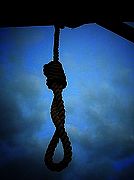Stop Cooperating with the Islamic Republic
» Protests to the Execution of 71 people in 2 Weeks
Official news sources of the Islamic republic of Iran have reported that between May 1 and May 23rd at least 48 people were executed in Iran on charges of “drug trafficking” and “rape and sexual molestation.” Private sources speak of another 23 executions. In addition, an official news agency has reported that the case involving 9 members of a gang has been moved to the execution phase in the province of Gilan adding that 7 of the members are facing the death penalty.
Details of execution of the death sentence in Iran are not regularly and completely published in Iran but even the official figures presented for the month of Ordibehesht (April 21 to May 21) and the first two days of Khordad (May 22 and 23rd) indicate that 27 people were executed during this period, demonstrating a significant rise in the death penalty compared to the previous month (of Farvardin).
The Iran Human Rights Organization (Sazemane Hoghooghe Bashar Iran) which tracks, registers and documents executions in the country issued a statement indicating its disbelief over the silence of the international community over the rise in executions in Iran and has called on the United Nations to review its relations with the Islamic republic and “end all relations with the Iranian regime.”
50 Executions in One Week
In the latest cases involving the execution of the death penalty, the official site of the Fars province judiciary announced the execution of three prisoners on charges of drug trafficking on Wednesday May 23rd. These individuals had been arrested between 2007 and 2010 and tried in revolutionary courts ending in their death sentences.
Jame Jam newspaper has announced the trial of 9 young men charged with “inflicting injury and producing amoral videos” of an 18-year old woman in branch 12 of the Gilan province criminal court. Seven of those charged have been sentenced to death which have been confirmed by Iran’s supreme court and the sentence sent to the execution office of the province’s judiciary.
Just a day before this report, state news agencies, including the student ISNA news agency, had announced the execution of 14 prisoners on May 22nd on drug trafficking charges.
While normally official sources refrain from publishing the names of such executions, in this case however the names of all the victims were published in full.
Following these reports, the Iran Human Rights Organization issued a statement strongly condemning the executions. Mahmood Amiry-Moghadam, the spokesperson of the organization, said, “We are shocked at the silence of the international community despite the execution of 50 death penalty sentences in Iran in just one week.” According to the statement issued by the organization 80 percent of all executions in Iran are because of drug trafficking offenses that are tried in closed court sessions in revolutionary courts. Amiry-Moghadam called on the United Nations to review its cooperation with Iran and said, “Many individuals who are arrested because of this cooperation are executed in the country. The international community must condemn these executions and should stop working with the Iranian regime until it is assured that its cooperation with the regime does not promote the execution machinery of the state.”
Just a day prior to the statement by the organization, official news sources reported (on May 21st) the execution of two prisoners in a Sanandaj prison on charges of robbery and rape. A day before that a prisoner was hanged in the town of Sari on drug related charges. On the very same day, Kordpa Kurdish news site reported the execution of a prisoner with the name of Hiyooa Havas in the Dizelabad prison of Kermanshah. The report did not include the charges against the prisoner but it did confirm that his arrest had taken place following the 2009 presidential election protests. Official sources have not confirmed this execution.
On May 20, Iranian media reported the execution of two prisoners in Isfahan on charges of rape and robbery. Their full names have not been published.
Reports published on May 17 and 18 indicate that at least 26 prisoners in three different prisons in Iran were hanged on these days. According to official reports 7 people were executed in Kermanshah on those two days while another three were executed in the town of Ardebil on drug related charges.
Unofficial reports speak of the execution of another 16 prisoners in the town of Yazd, on the same days. Among these are four women and five of those executed were Afghani nationals.
On April 16, Fars news agency quoted the head of the Ardebil province judiciary to confirm that 85 individuals has been sentenced in the province on charges of drug smuggling.
The average number of executions in Iran in 2011 stood at two individuals per day, ranking Iran as the country with the second highest executions after China. Figures published and reported for this year indicate a sharp rise in the number of executions and human rights activists predict that Iran will top the list this year.
The rise in executions in Iran have been condemned by countries and international organizations in recent years. The Norwegian ministry of foreign affairs, for example, announced earlier that it would take up the issue of growing number of executions in Iran with authorities of the Islamic republic.


